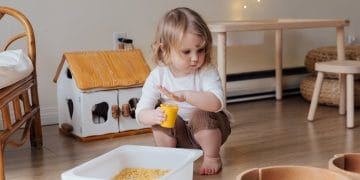There was a time when parents did not have many methods to keep their kids engaged while they completed their chores. However, the development of mobile phones, tablets, and laptops has made it easier to keep children distracted. You may allow your three-year-old to watch cartoons on your phone.
Whatever the case, it is necessary to balance screen time for kids. This is because young ones can easily get addicted to gadgets and forget about their surroundings. Most kids with weak eyesight mainly suffer because of excessive screen time.
So if you want tips for balancing the screen time of your toddler, you’re in the correct place. Here is everything you need to know.
Key Notes
- Do not give your kids personal gadgets from an early age
- Engage your toddler in extracurricular activities or playdates with other children to help them have fun without gadgets
- Include technology-free time in your kid’s schedule
- Keep screens in the living room or shared spaces for watching over your toddler easily
7 Tips For Parents On Balancing Screen Time For Their 3 Year Old
Here are the top seven times that will help you balance a healthy screen time for your three-year-old:
1. Avoid Giving Your Kid Personal Gadgets
Many parents give their toddlers personal gadgets such as a tablet for enjoying cartoons and other series. However, this is not the best option if you want to balance screen time. Giving tech items from an early age will cause toddlers to get used to gadgets.
This can create issues in later life because the kid will demand a mobile phone or other gadgets significantly early. By avoiding giving personal tech items, you can limit the usage of screens. After all, your toddler will have to ask you for your phone or tablet before using it.
Interacting with your kid is a better option than handing them a device. You can keep your child engaged without increasing screen time. It will also help you bond with the young one more easily.
No personal gadgets also mean that the toddler will not become dependent on electronic devices from an early age. It is best to give a smartphone or tablet to your kid for personal use after they have entered middle school or high school.
2. Engage The Kid In Other Fun Activities
Engaging toddlers in fun activities is relatively easier than helping teenagers have fun. You can place your three-year-old in a recreational dancing class or sports academy to help them have fun. Another option is to schedule playdates with other kids.
Playdates are an excellent idea to help your toddler make new friends and enjoy with other kids instead of gadgets. You may also use the date to improve the physical and mental development of the kids. Collaborating with other parents you know can help you with this option.
The best part about engaging your toddler in other activities is that it will not cause the child to feel bored. Your kid will also not find it necessary to use electronic devices at an early age. Some games that you can include in playdates are:
- Building towers with blocks
- Hide and seek
- Simon says
If you cannot manage playdates or enrolment in extracurricular classes, you can also play the earlier games with your kid at home. The main purpose is to keep your toddler away from electronic devices and offer alternatives for having fun.
3. Incorporate Technology-Free Time
You may have allowed your child to use gadgets such as a TV or tablet at home. This is normal because cartoons are only available on electronic devices. However, you should balance screen time by restricting the usage of different tech items.
One way to restrict usage is by including technology-free time in your toddler’s daily life. At a specific time, your kid must not be allowed to use electronic devices. You may use this time to bond with your kid by playing games with them.
Other things you can do during the technology-free time are:
- Read books to your toddler
- Go to the park with your kid
- Take your child out for ice cream or other fun activities
Avoid taking your child to a place with an arcade when using this time to engage the young one in a fun activity.
This is because many arcade games also, such as racing cars and bikes, involve screens. So you may not be able to limit usage by visiting an arcade.
4. Keep Screens In Shared Spaces
Another excellent way to balance screen time is by keeping gadgets in shared parts of your home. For instance, you may place the TV or computer in the living room. This will allow you to monitor your child easily when they use a device.
You can also understand screen time better if your toddler is easily visible to you. This tip will also help you observe what your kid is watching and whether the content is appropriate for a three-year-old. Remember, this option is also useful if your three-year-old has older siblings.
Allowing your kids to use screens in the kitchen will also help with monitoring. This is because you may spend most of your time completing chores in this part of the house.
5. Put A Screen Limit On The Device
Improvement in technology offers many new options to parents for balancing screen time. Many devices allow you to set time limits on different apps. Once the limit is reached, the app will not be accessible for the rest of the day.
A passcode may also be required to remove the restriction. This means that your toddler will not be able to tamper with the setting. You can use this option to prevent your kid from using a device excessively.
If you don’t want to put restrictions through device settings, you may track the daily screen time through settings. You can use the data to manually prevent your kid from using the device during specific hours.
6. Do Not Let Your Kid Use Devices At Night
Many kids prefer to use electronic devices at night because they may be tired from engaging in physical activities requiring movement. To prevent your toddler from becoming dependent on a device, you should make a rule of not using tech items at night.
This will balance the screen time efficiently because young ones have many things to do during the day. So your kid may not be able to use the device in the morning or afternoon, limiting screen usage significantly.
7. Explain All Rules To Your Child
Your toddler may have visited a friend’s house and used the TV throughout their hours of stay. However, you may only allow your kid to use the TV for one to two hours only. The kid may not be able to understand this different rule.
So it is your duty to explain rules to your child about screen time. Explaining simple disadvantages may also help you make the toddler limit screen usage on their own.
The top thing you must do is be patient with your child and set clear boundaries about using screens.
Conclusion
These are the seven best tips for balancing the screen time of your three-year-old. By following these things, you can offer your kid a healthier childhood full of fun.




























